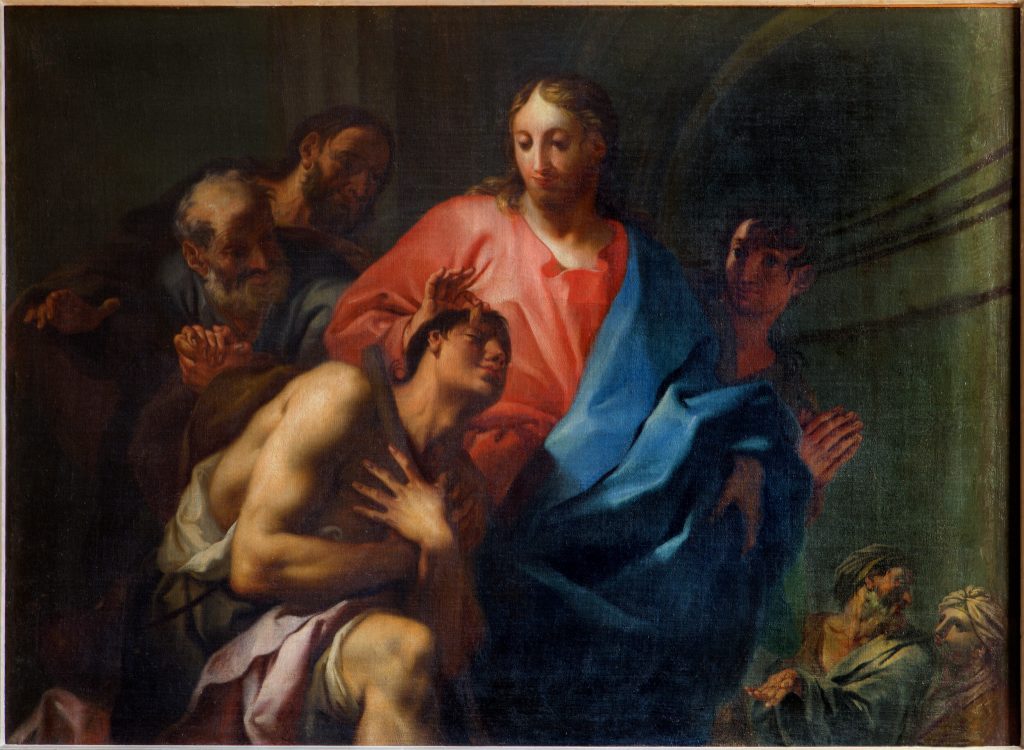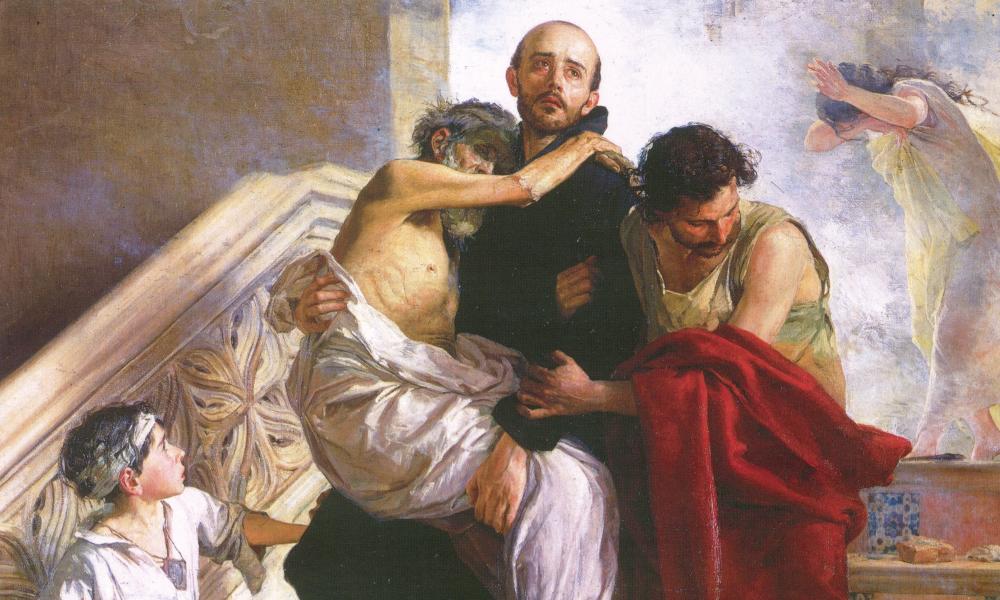
The story of the healing of the blind man is a story of perennial relevance to us. It speaks of skepticism, of hostility to Christ, of denial of the efficacious nature of Christian faith and belief in the gospel. And in our current moment in history, we can see how Christianity has been dismissed as irrelevant, blamed for the ills of society and accused of fraud.
The young man who Jesus approaches and heals, receives the benefit of healing without asking, really. The fellow is the subject of an impromptu debate over the matter of what we might call “natural evils” or perhaps, the suffering of the innocent. For, indeed, what had that man done to deserve a lifetime of blindness in a world very different from ours, where such a disability left one with few options for living aside from begging.
Now, a dynamic somewhat hidden from us in this story is the role that the indigent played in society then, and I would say, even now. They are to be pitied, and so, they are means by which we can demonstrate our virtue of charity. And even Jesus councils us to be mindful of, and disposed toward the poor who are “always with us.” But the one thing that is unwelcome is for the poor, the indigent, those who are pitied, to improve themselves, to escape the prison of poverty and become one of us, the virtuous, the righteous. This disturbs that economy of virtue. And Jesus has certainly upset things – people need to stay in their places.
I’ve made mention before how poverty has become an industry in the post-Christian West; the great city bureaucracies, the government departments both national and of the sub-federal jurisdictions of every Western nation, expend tremendous resources toward the care of the poor; and with little result aside from their continuing existence, often in the misery of poor mental health, addiction, and criminality.
Indeed, when governments post their economic statistics, the hiring of more social workers, and others for the system, the money expended on those enrolled in the programs of support that too often lead to abject dependence, these are all recorded as economic activity that boosts the country’s GDP. It’s ridiculous, of course, to see this as growing the economy or improving national life. But there we are.
On the individual level, the person who comes to faith is, if it is a sincere conversion, transformed and they effect an escape from, at the least, poverty of mind and spirit. And again, the world doesn’t want that – it wants individuals dependent on it for distractions and diversion from the worries of life. It doesn’t want self-examination that leads to meaningful change, but rather self-obsession that lead to neurosis, and further dependence.
This past Friday was the memorial for St. John of God; and his story was that of a sixteenth century bruiser, a tough guy, a man who made his living by hiring out his muscle to whomever had the cash. He was a mercenary in foreign wars, and what we might call an “enforcer” in civil life, and that worked for him, til it didn’t, until the life of killing or threatening to kill people finally got to him. It was then that he went off to see the Carmelite community in Avila, Spain. He gave himself to Christ, became a hospitaller, that is a man who runs a hospital; and ended his days as a man renowned for his compassion. I mention him again today, because if you want to know how great were the results of his conversion, you just have to go down to the Good Shepherd Center here in Hamilton, and there you will see members of the Order of St. John of God, in their black monastic habits or perhaps just in everyday clerical dress, at work administering the centre as well as a number of shelters and other facilities of outreach in our municipality.

This has nothing to do with Jesus does it? A man of brutal violence, blind to the suffering he inflicted on others, has an encounter with Christ more than four hundred years ago, and as a result, we have a women’s shelter, a men’s shelter, a shelter for expecting moms, a community kitchen, a food bank, and a lot of other things designed to relieve suffering and give people a leg up and out of poverty here in Hamilton, and not just here, but in cities around the world where the brothers of John of God operate? Nonsense, we want real proof, how did all this really come about?
We’re celebrating another scrutiny today, an act of prayer over those preparing for baptism. Our concern is that they truly receive the Holy Spirit at the Great Vigil of Easter, Holy Saturday night. Now, the teaching of the Church with respect to what will happen is the Latin phrase, ex opere operato – that is translated as “from the work worked.” And that simply means that the sacrament is effected regardless of the disposition of either the minister or the one receiving the sacrament. So, I can show up at the vigil in a foul mood, in no way properly disposed for the celebration of baptism, but in saying the words, and performing the actions, people will be validly and lawfully baptized. And those baptized may be utterly indifferent, doing it for unworthy reasons (is anybody getting a car for this?), yet they will be lawfully and validly baptized.
Like the man born blind given sight today, who didn’t ask for his healing, sight is restored. And in your case, the stain of sin, both personal and original is wiped away; you will be spiritually reborn. And then the question will be, what am I to do now? How will you understand what happened? What will you say?
There will be those around the newly baptized, especially for those youth who choose this, who will likely give this all a skeptical reception. We know from decades of social studies in religion, that youth are particularly spiritually vulnerable – the acceptance of peers is by far the greatest consideration given in life decisions. And since religion is seen in our culture as being something old, and for the old, those who need to alleviate fear of death, or simply find something to do with their free time, it is unattractive and unengaging.
Well, if you reduce Catholic faith to going to mass, that might very well be to some degree accurate. I think our mass at St. Augustine isn’t too bad, at least the music is good; I won’t speak to the preaching. But this isn’t the whole of what the walk with Christ is about.
In Christ we are, to borrow a term from the baptism ritual, “enlightened” – the darkness of existence, the dimness with which we see past and future and even the present, is illuminated and we can see a little more clearly. Blind to so much, be it the suffering of others, our own sins, the injustice of society, our lack of kindness toward friend and strangers, all of this by the grace of God through our encounter with Jesus Christ in word and sacrament begins to end. Come to mass, or come to a holy hour in Eucharist adoration, sit at home with the Bible open on your lap reading, or listen with intention to what our lectors read to you, Christ will touch your heart, and give you spiritual sight.
And by that sight, we all pray that those to be baptized, those already baptized, will recognize who has done this, and from the heart say, “Lord, I believe” and worship him.
Amen.